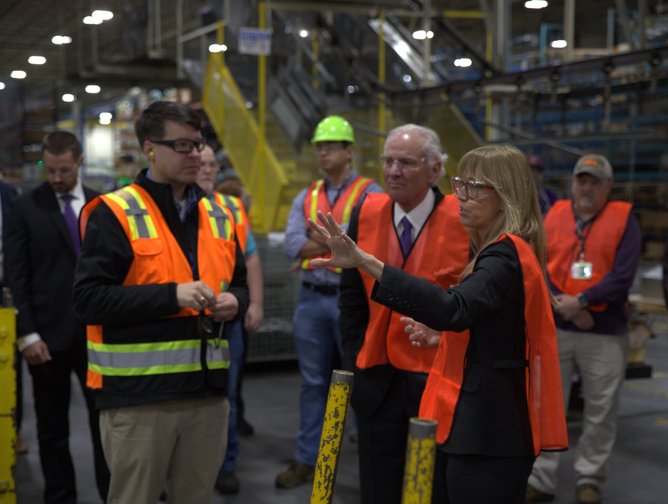Sustainability Paves Way for More Women in C-Suite Roles

Countless surveys and reports reach one consistent conclusion – having more women in leadership roles is the best way for a business to increase profits, innovate, and reach sustainability goals.
Despite this, the World Economic Forum’s latest Global Gender Gap Report states that less than a third (32.3%) of senior leadership positions are held by women.
Progress has been made, but it remains slow, and the increased emphasis on sustainability is helping to blaze a trail for a new wave of women heading to the C-Suite.
The rise of the Chief Sustainability Officer has had a significant impact on the makeup of the C-Suite in the last decade, and has also gone a way towards addressing the gender imbalance – as more companies elevate the sustainability leader’s role which is increasingly taken by women.
This double whammy has been a boon for women.
Sustainability as Route to Leadership
Insight from Oliver Wyman says that up until a few years ago, the sustainability leadership role was “generally excluded from the boardroom and key decision-making, buried two or three tiers down or limited to heading up sub-committees. Now, it is seen as essential to shaping the strategy and future of businesses”.
Research from Climate Impact Partners in 2023 found that 43% of Fortune 500 companies have a CSO or equivalent. In 2020, that figure stood at just 19%. What’s more, CSOs are increasingly not only operating at C-Suite level but also have a direct line to the CEO – you could say they have become the CEO’s right-hand woman.
As a route to leadership goes, sustainability is opening the door for more women to advance at a faster rate than other business areas, certainly in developed economies like the US – where the percentage of women in the CSO role doubled between 2011 and 2023, according to the 2023 Weinreb Group Chief Sustainability Officer Report, reaching 58%.
“We see more women than men in the sustainability pipeline, and we also know that the most effective CSOs combine strategy and business acumen with strong communication skills, which has traditionally been considered a female leadership quality,” says Ellen Weinreb, founder of Weinreb Group.
“It's exciting to see more women in the C Suite, and I think it's generally understood that companies thrive with diversity at all levels. What we're not seeing yet, however, is a path from CSO to CEO. I think we will get there, especially as sustainability becomes increasingly synonymous with business success.”

When it comes to the C-Suite, women’s representation is just 25% on average, compared to 46% of entry-level positions.
This so-called ‘drop to the top’ also varies across industries, with women faring better in education, retail, and consumer services – and worse in real estate, construction, and financial services.
Having more female representation in senior leadership roles, like CSO, is a significant step forward. It’s a classic case of ‘you have to see it to be it’. And when it comes to the top job, that visibility is poor.
S&P’s Global Corporate Sustainability Assessment showed that only 4.4% of 5,400 companies assessed had a woman CEO. In North America, women hold 7% of CEO roles. In Asia, that drops to 3%, and in Latin America just 1.5%.
However, the rise of the CSO could lead to more women CEOs.
Female Leadership in Aviation
Delta Air Lines’ CSO Amelia DeLuca admits that sustainability has always played a role in her personal life – from raising her children to making purchasing decisions at home, or supporting environmental initiatives – but it took years working at Delta before it became a career.
“From the get-go, I was hooked because sustainability is all about innovation, partnerships, data and blazing new paths without always knowing if you’ll reach the destination or need to pivot after a short layover,” says DeLuca.
She says that while the aviation industry historically has not had a lot of female representation, let alone in the C-Suite, that has been changing at Delta for some time.
“I’ve been fortunate to have many female leader mentors throughout my career while trying to pay it forward to others,” she says.
“Every leader should find opportunities to lift women and other underrepresented groups up, give them a voice when they are not in the room and find opportunities to bring them into the room all together.”

DeLuca agrees with Weinreb that there could be a natural path from CSO to CEO.
“I do think that the CSO role is uniquely positioned because success doesn’t just lie with what my team does,” she says. “It’s also how we communicate and partner with stakeholders, industry collaborators, investors, policymakers and more. It’s a complex web of players who all need to be engaged.”
The shift within the corporate world towards sustainability and social responsibility is serving as a catalyst for change in terms of female leadership and diversity. So says Heather Cykoski, Schneider Electric's SVP of Industrial Automation US and Process Automation Canada.
There are several reasons why this shift in corporate values may contribute to more opportunities for women in leadership roles, foremost among them being a balanced alignment with values.
“In my experience, many women gravitate towards organisations that align with their personal values, including those related to sustainability and social responsibility,” says Cykoski, who has spent 25 years in energy and industrial engineering and worked all over the world.
“As companies prioritise these values, they may become more attractive to female talent, ultimately contributing to a more diverse leadership pool that is inherently more inclusive.
“Additionally, a focus on sustainability often requires a shift in corporate culture towards long-term thinking and a broader view of success. Such changes can challenge traditional norms and open the door for different leadership styles, providing an opportunity for women to contribute in meaningful ways.
“Companies that prioritise sustainability are usually more likely to embrace diverse leadership, as it aligns with the holistic approach needed for effective sustainability initiatives.”

For DeLuca, the role of a sustainability leader is to provide the energy and advocacy required to champion progress, even when it is difficult or inconvenient for an organisation to do so.
It means providing the rational and unrelenting voice that does not shy away from challenges or barriers – all the while being able to communicate clearly so stakeholders don’t lose sight of the ultimate goals.
“When I think about women’s business leadership more broadly, women are only going to continue to grow into more leadership positions,” says DeLuca.
“We are no strangers to doing hard things, we are often great communicators and have historically been strong people leaders, especially through transitional and evolving times.”
Cykoski says that while there are positive signs, more companies need to ‘walk the talk’ when it comes to recognising diversity.
She says that as the significance of Environmental, Social, and Governance (ESG) continues to grow, and sustainability ingrains itself into the core of company strategy and culture, she has observed an increase in the elevation of women to senior leadership roles, including board seats.
“Nevertheless, during my mentoring sessions with Advancing Women Executives (AWE), we continue to discuss the need for greater representation of women on board seats. It can be irksome for me when companies assert a lack of qualified individuals, especially considering there are undoubtedly highly qualified women available,” says Cykoski.
“I firmly believe that it requires a company to recognise the significance of diversity, and actively demonstrate this belief through actions – a commitment to walking the talk, so to speak.”

Cykoski is quick to add that Schneider Electric goes beyond just talking about its commitments. The company actively seeks partnerships that embrace diversity, making inclusivity a priority in collaborations.
“It's not just a pledge; we're taking real steps and consistently measuring and tracking our progress within our business,” she says. “We're creating opportunities for women and witnessing their growth first-hand.”
As ESG grows in importance in global companies and sustainability becomes a core part of company strategy, proposition, and culture, are we likely to see more gender diversity in leadership?
DeLuca believes so. She says data shows that more diverse leadership and more diverse teams boost productivity, attract new talent, build more trust, boost profitability, create new opportunities, and more.
As companies continue to invest in ESG strategies, they will continue to see the benefits of more diverse leadership teams and prioritise those leaders as part of their culture and strategy.
While the role of CSO currently offers this pathway to the C-Suite to more women, it’s vital to have similar routes in other leadership roles, too. So how can that be achieved?
“People are what matter, so finding opportunities to provide mentorship, sponsorship, and advocacy for women and diverse voices is critical to enhance this pathway,” says DeLuca.
“Give people projects, teams, and initiatives to show their value and provide mentorship along the way that leads them to success. If you see other opportunities where they can succeed, advocate for them – especially if they aren’t in the room. That’s how I got to where I am in my career, so I am proof that this works.”

The increasing emphasis on ESG and DEI underscores the need for more empathetic leadership, according to Cykoski. She says women often exhibit greater interpersonal skills and emotional intelligence, placing them in an advantageous position to excel in leadership roles that require understanding and addressing diverse stakeholder needs.
“Companies seeking to enhance their stakeholder relationships will find that women leaders bring a unique perspective and skill set to foster a more inclusive and compassionate corporate culture,” says Cykoski.
“In essence, the evolving landscape that prioritises empathy in leadership aligns with many qualities associated with effective female leaders. This creates an opportunity for women to not only contribute meaningfully to the current discourse on ESG and DEI but also to ascend to leadership positions, including board roles, where their empathetic leadership style can drive positive change and impact.”
Positive change is welcomed, and having more women in leadership roles could transform the very nature of business – from doing well to doing good.
******
Amelia DeLuca CV
As Chief Sustainability Officer for Delta Airlines, Amelia is leading Delta on its journey to reach net-zero emissions by 2050.
“I came into this role because I had a strong track record as a team leader with an ability to galvanise teams to solve hard problems,” Amelia says. “I have a background in Math, so I love data. Across Delta and within my role, we follow the data. We are committed to science-based targets and are always testing, iterating, and re-testing based on the feedback and data we receive.”
She previously served as VP, International Customer Experience and Partner Sustainability where she led cross-divisional efforts to deliver a consistent premium customer experience across Delta’s partners.
She also supported the development of Delta's partner sustainability strategy across its global partner network to accelerate the alliance’s leading sustainability position.
During her 17-year career with Delta, Amelia has held leadership positions within the Sustainability, Global Sales, Revenue Management and Network Planning teams and been based in Mexico, the US, and the Netherlands.
Heather Cykoski CV
Heather Cykoski is Senior Vice President, Industrial Automation US and Process Automation Canada at Schneider Electric.
She became an engineer because she knew she “could bring something different to the profession as a woman”. She’s now spent 25 years in energy and industrial engineering, securing numerous honours, including being named to the 10 Most Influential Women in Technology in 2020.
As SVP, Heather works closely with partners and stakeholders to address the industry’s green energy trilemma of balancing modernisation plans, managing security concerns, and working within limited resources. “We empower individuals and organisations of all kinds to make the most of the energy and resources they have available, bridging progress and sustainability for all.”
******
Make sure you check out the latest edition of Sustainability Magazine and also sign up to our global conference series - Sustainability LIVE 2024
******
Sustainability Magazine is a BizClik brand







